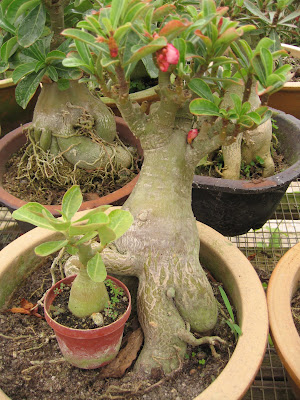the desert rose (adenium obesum) is a succulent bush with thick, fleshy branches. the 'obesum' in its name refers to the large, fat base. this plant, usually grown in a pot, is popular with chinese families but i have also seen my malay neighbour growing it. i stopped having this plant after the last one lost all its leaves, shrivelled up and refused to re-grow new leaves. i think i must have overwatered the plant.
the leaves are glossy green and semi-deciduous. if left without added water and no rain for a long time or after a cold night (in temperate countries), the desert rose can lose most of its leaves. but, fear not, the leaves will usually re-appear if the plant gets some water or when the weather becomes warmer.
i have come across four colours in its flower - pink, red, white and white mixed with pink at its edge. this spring orchard at lane 4 lim chu kang has all the four varieties.
the adenium obesum produces bean-like seed pods. the same orchard has many pots of baby plants. they must have propagated them from seeds, and not from cuttings.
one not so common desert rose is the one with variegated leaves. when pruning the plant, you must avoid contact with the sap. the sap is believed to be poisonous, and so you should clean your hands after you have done your pruning.












2 comments:
I fell in love with this plant when I saw it the first time… absolutely gorgeous.
The Chinese name for this plant is ‘Fu Kwee Hwa’ (Prosperity Plant).
It requires little care and can take a good deal of neglect. A small pot with excellent drainage is a must. It does not like both over-watering and drying-out. To make the plant develop a large swollen base/trunk, frequent applications of fertilizer is necessary. Requires lots of light for heavy flowering. Kept dwarfed and root-bound in a pot, most plant enthusiasts plant it 'bonsai' style with part of the roots exposed, to give it that "aged" look. The Chinese believe that this plant brings good luck, hence the name Prosperity Plant!
no wonder it is popular with the traditional chinese. around cn, some even tie red ribbons on the plant.
Post a Comment